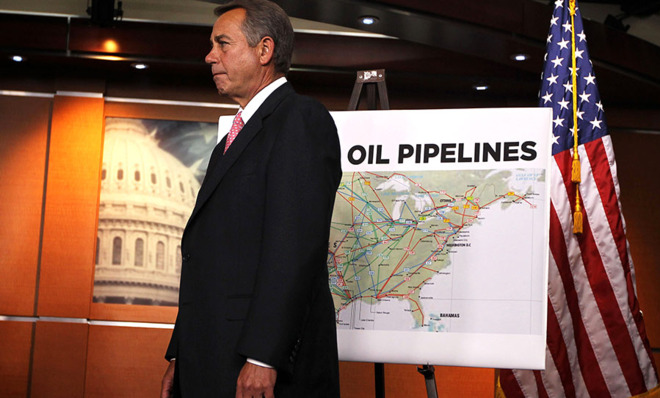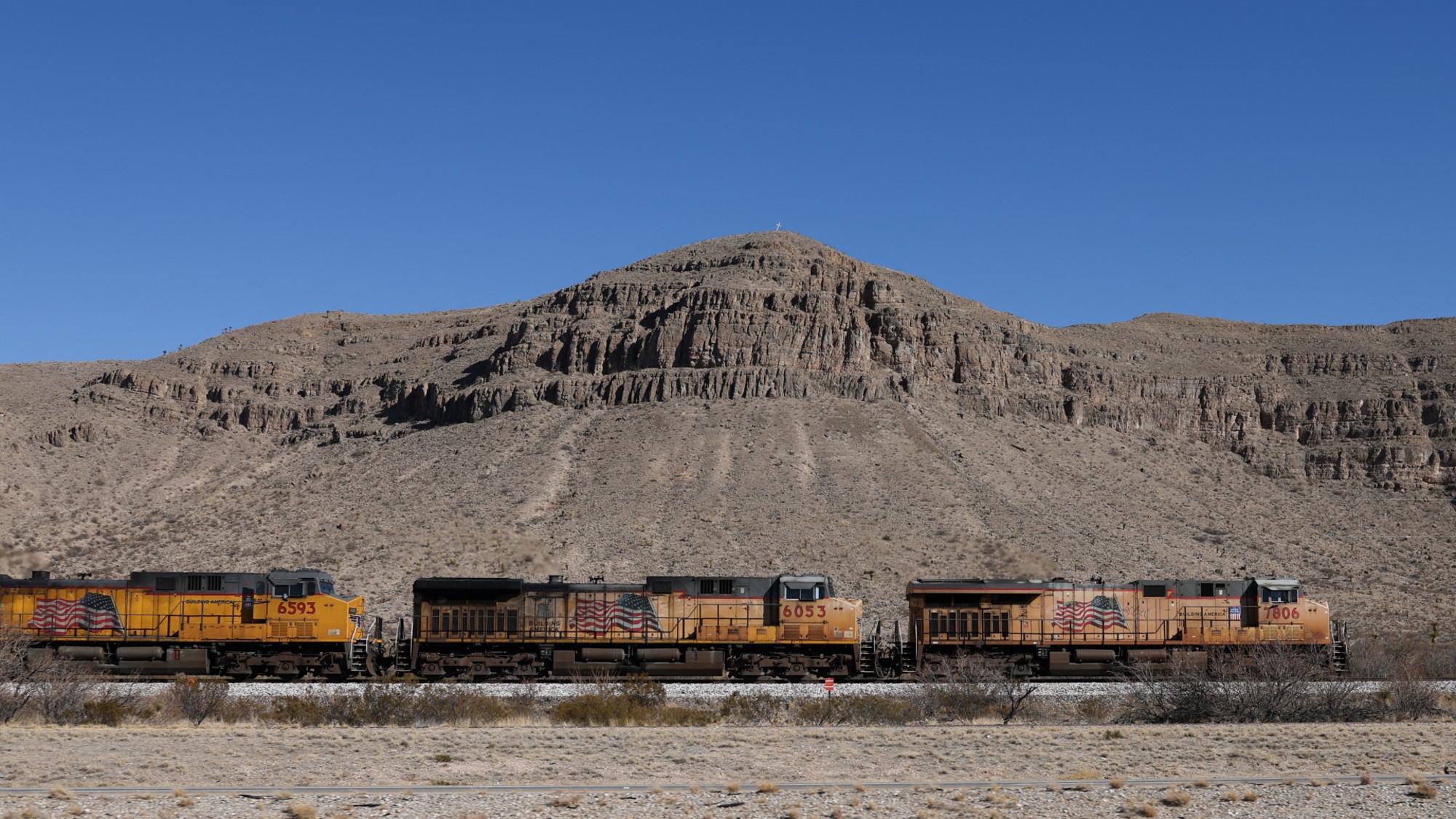Sorry, Republicans: The Keystone XL pipeline is not a jobs agenda
The GOP is talking a big game as it takes over Congress. But its policies are pathetically modest.


In the new Congress, Republicans will have the majority in both the Senate and the House for the first time in eight years. As they get ready to take power, their rhetorical focus is clear: jobs, the economy, and more jobs.
So far, there are two main proposals on deck for the GOP. First, the Hire More Heroes Act, which would make it easier for small businesses that hire veterans to deny health care to their employees. Second, they want to immediately build the Keystone XL pipeline, a project that would transport oil from Canada to the Gulf Coast.
On their own, these are both extremely small-bore policies. But as a jobs agenda, this doesn't even rise to the level of pitiful. It's the latest evidence that Republicans continue to struggle with basic macroeconomics — and it does not bode well for the nation should they win the White House in 2016.
The Week
Escape your echo chamber. Get the facts behind the news, plus analysis from multiple perspectives.

Sign up for The Week's Free Newsletters
From our morning news briefing to a weekly Good News Newsletter, get the best of The Week delivered directly to your inbox.
From our morning news briefing to a weekly Good News Newsletter, get the best of The Week delivered directly to your inbox.
Let's examine the Hire More Heroes Act first. ObamaCare requires that all businesses that have over 50 full-time employees provide health-insurance benefits. This law would exempt veterans from counting toward that cap, thus making it easier to expand a business over 50 employees if you hire veterans.
On its face, this might not even be a terrible idea. Health-care policy experts have long argued that funneling American health care through employer subsidies is bad, locking people into jobs they don't like for fear of losing coverage, and increasing health-care spending. Rolling that system back very slightly might be a good thing. My problem is that there's no reason to direct general social spending to veterans so preferentially.
But make no mistake, this is a tiny, tiny policy involving a relative handful of people and jobs.
Keystone XL is bigger in one respect. Generous estimates predict that the pipeline would create around 42,000 temporary jobs — about 2,000 construction jobs and the rest in supplying goods and services.
A free daily email with the biggest news stories of the day – and the best features from TheWeek.com
How many long-term jobs? Fifty. That's right, 50 whole long-term jobs. (One more, and the pipeline would have to get health insurance for them! Unless they hired veterans, I suppose.)
Furthermore, the argument that Keystone XL would help by lowering gas prices just had the legs kicked out from under it, with the price of oil plummeting toward $50 per barrel with no sign of stopping. This was always a bogus argument, since the pipeline is a drop in the bucket compared with world supply, but now it makes even less sense.
To get a sense of the bigger picture, the U.S. economy pumped out probably close to 3 million jobs total last year. The GOP's proposals, if enacted, will fail to make more than a small ripple in the job market.
The problem with the American economy is the same problem we've had since 2007: a lack of demand. With factories idle and workers unemployed, there's not enough spending and not enough investment. Nations have two options for attacking this problem. First, spend money, through government investment in things like infrastructure, or handouts to citizens in the form of checks or tax cuts (fiscal policy). Second, use control of the money supply to ease credit and stimulate lending (monetary policy).
Republicans used to accept this framework, proposing a $713 billion government stimulus bill as recently as 2009. But they've since regressed intellectually to the pre–Great Depression era. The economic policy of the GOP today is almost indistinguishable from the days of Herbert Hoover and Andrew Mellon. Their platform is muddled on fiscal policy, proposing massive spending-side cuts coupled with large tax cuts for the rich — which in macro terms would cancel each other out. On monetary policy, they propose tighter money and reexamining the gold standard — which would slow the economy and throw people out of work. At best, it's a large net negative for workers.
After the colossal failure of Hoover, when the Republican Party was largely locked out of national politics for a generation, they learned that parties ignore the lessons of Keynes at their peril. But it seems they will have to learn them again — and if they win full power in 2016, it will be at everyone's expense.
Ryan Cooper is a national correspondent at TheWeek.com. His work has appeared in the Washington Monthly, The New Republic, and the Washington Post.
-
 Zimbabwe’s driving crisis
Zimbabwe’s driving crisisUnder the Radar Southern African nation is experiencing a ‘public health disaster’ with one of the highest road fatality rates in the world
-
 The Mint’s 250th anniversary coins face a whitewashing controversy
The Mint’s 250th anniversary coins face a whitewashing controversyThe Explainer The designs omitted several notable moments for civil rights and women’s rights
-
 ‘If regulators nix the rail merger, supply chain inefficiency will persist’
‘If regulators nix the rail merger, supply chain inefficiency will persist’Instant Opinion Opinion, comment and editorials of the day
-
 Bari Weiss’ ‘60 Minutes’ scandal is about more than one report
Bari Weiss’ ‘60 Minutes’ scandal is about more than one reportIN THE SPOTLIGHT By blocking an approved segment on a controversial prison holding US deportees in El Salvador, the editor-in-chief of CBS News has become the main story
-
 Has Zohran Mamdani shown the Democrats how to win again?
Has Zohran Mamdani shown the Democrats how to win again?Today’s Big Question New York City mayoral election touted as victory for left-wing populists but moderate centrist wins elsewhere present more complex path for Democratic Party
-
 Millions turn out for anti-Trump ‘No Kings’ rallies
Millions turn out for anti-Trump ‘No Kings’ ralliesSpeed Read An estimated 7 million people participated, 2 million more than at the first ‘No Kings’ protest in June
-
 Ghislaine Maxwell: angling for a Trump pardon
Ghislaine Maxwell: angling for a Trump pardonTalking Point Convicted sex trafficker's testimony could shed new light on president's links to Jeffrey Epstein
-
 The last words and final moments of 40 presidents
The last words and final moments of 40 presidentsThe Explainer Some are eloquent quotes worthy of the holders of the highest office in the nation, and others... aren't
-
 The JFK files: the truth at last?
The JFK files: the truth at last?In The Spotlight More than 64,000 previously classified documents relating the 1963 assassination of John F. Kennedy have been released by the Trump administration
-
 'Seriously, not literally': how should the world take Donald Trump?
'Seriously, not literally': how should the world take Donald Trump?Today's big question White House rhetoric and reality look likely to become increasingly blurred
-
 Will Trump's 'madman' strategy pay off?
Will Trump's 'madman' strategy pay off?Today's Big Question Incoming US president likes to seem unpredictable but, this time round, world leaders could be wise to his playbook
